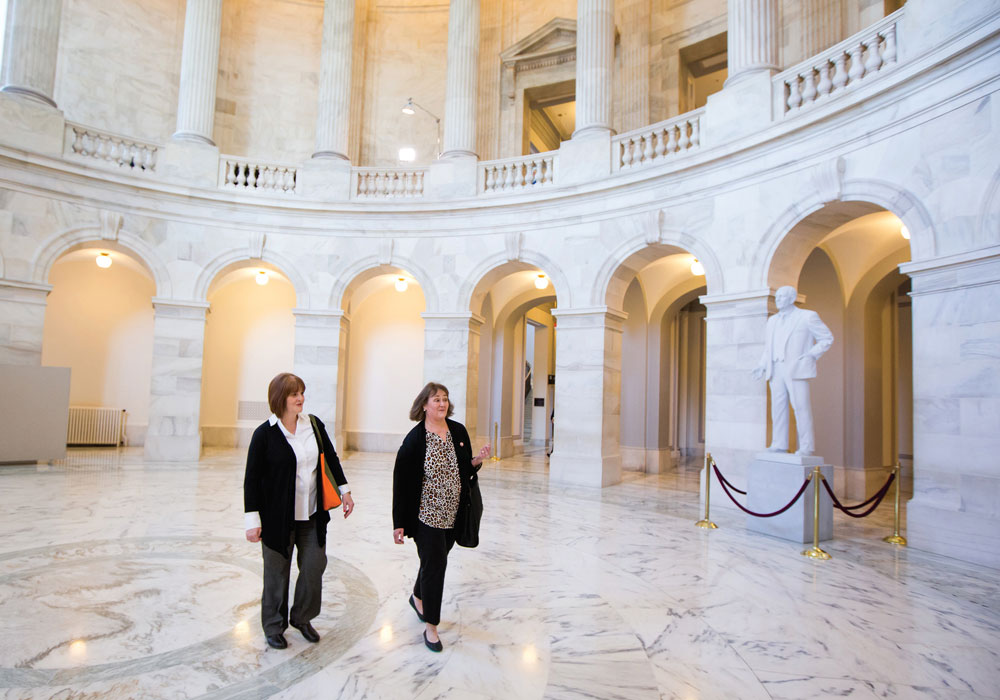Over the summer, I coordinated a now all-too-familiar exercise: a Zoom call with multiple ONS Kansas-area chapter members, nurse experts, patient advocates, and elected officials. Spearheaded by the ONS National Office, we hosted an incredibly personal and informative conversation to discuss the COVID-19 coronavirus, how it affects patients with cancer, and the legislative and regulatory environment throughout our state. Our bipartisan, multitiered event brought together oncology nurses from across the state, and, although some political views were different, we united in our commitment to nurses and public health.
When Health Care and Politics Meet
The first speaker was Kansas House Representative John Eplee, MD (R-KS), who is no stranger to the complicated relationship between health care and politics. He is one of only a few doctors in the state legislature. When asked to describe the experience of being a doctor in politics, trying to educate his colleagues and cohorts, he had one word: lonely.
“You’re in a hole sometimes because you’re fighting Doctor Internet,” Eplee said.
He cited misinformation about vaccines, where some politicians have refused to accept the scientific evidence. He said he was grateful for nurses’ aid in promoting public health with other state elected officials.
Healthcare Advocacy in Congress
Nurses also heard directly from U.S. Representative Sharice Davids (D-KS), who emphasized the importance of communicating with legislators and cautioned that the pandemic will continue to find its way into health policy disputes.
As a freshman member of Congress, one of Davids’ tenants has been to promote those on the front lines of care. She laid out a number of patient-centered issues and asked nurses to be a voice in her education her during today’s challenging times.
Davids said that coverage of preexisting conditions is a bipartisan issue and that access to affordable health care is more essential than ever before because of the pandemic. She urged the nursing community to continue to advocate for legislation that addresses these priorities.
“The pandemic has been revealing to us a lot of the places where the system is not working for everybody,” Davids said.
Telehealth During a Global Pandemic
Telehealth use has skyrocketed during the pandemic. Insurance claims for medical services provided remotely have increased by more than 8,000% from April 2019—April 2020.
Eplee called telehealth a “gamechanger” and said that he thinks it will continue even after the pandemic is under control.
Finding Your Purpose in Healthcare Advocacy
ONS member Lori Ranallo, RN, MSN, APRN-BC, CBCN®, breast cancer survivorship and prevention nurse practitioner at the University of Kansas Cancer Center and member of the ONS Greater Kansas City Chapter, said that Medicaid enabled her 13-year-old grandson to meet with mental health professionals via telehealth during the pandemic. Seeing how important Medicaid coverage has been for her son and grandson, who otherwise wouldn’t be able to afford health insurance, has inspired Ranallo to advocate for Medicaid expansion.
Kansas is one of only 12 states that hasn’t expanded Medicaid, according to Spencer Culver, an advocacy specialist with Alliance for a Healthy Kansas. Expanding Medicaid in the state would close the coverage gap for tens of thousands of uninsured Kansans who do not currently qualify. The state has come close to closing that gap before, with efforts to pass expansion narrowly failing in 2016 and 2019.
“Nurse advocates can really move the needle on this,” Culver said. “Nurses are very highly trusted by the public, and legislators really do care about constituent contact.”
Ranallo shared the importance of volunteering by giving the three T’s of advocacy:
- Time (contacting lawmakers, knocking on doors)
- Talent (presenting on issues; writing an editorial for your local newspaper; educating colleagues, patients, and caregivers)
- Treasure (donating, fundraising)
Culver also suggested using storytelling as a powerful public advocacy tool. The Alliance for a Healthy Kansas created a story-banking initiative with a staff member dedicated to interviewing people who don’t have coverage. The stories can be retold to voters and politicians as examples of why issues like Medicaid expansion are so pressing. ONS Voice also publishes nurse stories that can be shared during advocacy experiences.
“Nurses have expertise and trust to lean on when it comes to conversations with elected officials,” Culver said. “Rely on that expertise, and it will take you where you need to go.”
Nurses hold a unique position of authority and, during today’s challenging times, we hold an especially influential role as the public lacks trust in politicians and journalists—both of whom ranked substantially lower than nurses on the 2020 Gallup poll, which annually rates Americans’ trust in various professions. For more than 20 years, nursing has been the most trusted profession in the United States. We have the ability to make real changes in public policy.






